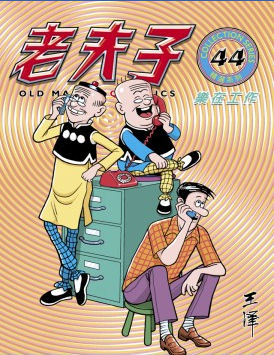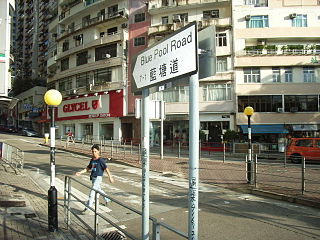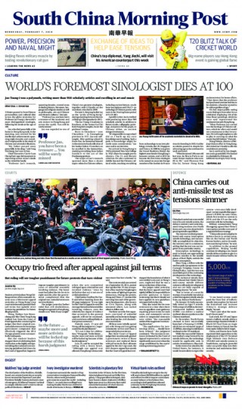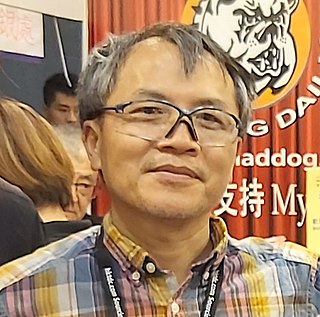
Hong Kong, officially the Hong Kong Special Administrative Region of the People's Republic of China, is a city and a special administrative region in China. With 7.4 million residents of various nationalities in a 1,104-square-kilometre (426 sq mi) territory, Hong Kong is one of the most densely populated territories in the world.

Tsui Hark, born Tsui Man-kong, is a Hong Kong film director, producer and screenwriter. Tsui has directed several influential Hong Kong films such as Zu Warriors from the Magic Mountain (1983), the Once Upon a Time in China film series (1991–1997) and The Blade (1995). Tsui also has been a prolific writer and producer; his productions include A Better Tomorrow (1986), A Better Tomorrow II (1987), A Chinese Ghost Story (1987), The Killer (1989), The Legend of the Swordsman (1992), The Wicked City (1992), Iron Monkey (1993) and Black Mask (1996). He is viewed as a major figure in the Golden Age of Hong Kong cinema and is regarded by critics as "one of the masters of Asian cinematography".

Mui Wo is a rural town on the eastern coast of Lantau Island in Hong Kong. The 2011 Census recorded 5,485 people living in Mui Wo and its environs.

Christopher Doyle, also known as Dù Kěfēng (Mandarin) or Dou Ho-Fung (Cantonese) is an Australian-Hong Kong cinematographer. He has worked on over fifty Chinese-language films, being best known for his collaborations with Wong Kar-wai in Chungking Express, Happy Together, In the Mood for Love and 2046. Doyle is also known for other films such as Temptress Moon, Hero, Dumplings, and Psycho. He has won awards at the Cannes Film Festival and Venice Film Festival, as well as the AFI Award for cinematography, the Golden Horse award, and the Hong Kong Film Award.

Larry Gonick is an American cartoonist best known for The Cartoon History of the Universe, a history of the world in comic book form, which he published in installments from 1977 to 2009. He has also written The Cartoon History of the United States, and he has adapted the format for a series of co-written guidebooks on other subjects, beginning with The Cartoon Guide to Genetics in 1983. The diversity of his interests, and the success with which his books have met, have together earned Gonick the distinction of being "the most well-known and respected of cartoonists who have applied their craft to unravelling the mysteries of science".

Old Master Q is a Hong Kong manhua created by Alfonso Wong. The cartoon first appeared in the newspapers and magazines in Hong Kong on 3 February 1962, and later serialised in 1964. The comic is still in publication today, and is the oldest Asian comic series in publication.

Alfonso Wong Kar-hei, also known by his pen name Wong Chak, was a Hong Kong manhua artist who created one of the longest-running comic strips, Old Master Q, that became popular across Asia.
Manhua are Chinese-language comics produced in Greater China. Chinese comics and narrated illustrations have existed in China throughout its history.
The World of Lily Wong was a comic strip by Larry Feign which began in 1986, running until 2001. During its early years, it was featured in several newspapers including The Standard and the South China Morning Post between November 1986 and May 1995; The Independent (UK) between March 1997 and June 1997 ; and the HK iMail from May 2000 until September 2001. It was revived in a Cantonese edition from October 2007 to March 2008.

Blue Pool Road is a road linking Happy Valley and Wong Nai Chung Gap on Hong Kong Island, Hong Kong.

Xu Xi is an English language novelist from Hong Kong.

The South China Morning Post (SCMP), with its Sunday edition, the Sunday Morning Post, is a Hong Kong-based English-language newspaper owned by Alibaba Group. Founded in 1903 by Tse Tsan-tai and Alfred Cunningham, it has remained Hong Kong's newspaper of record since British colonial rule. Editor-in-chief Tammy Tam succeeded Wang Xiangwei in 2016. The SCMP prints paper editions in Hong Kong and operates an online news website that is blocked in mainland China.
Hong Kong comics are comics originally produced in Hong Kong.

Wong Chin Foo was a Chinese American activist, journalist, lecturer, and one of the most prolific Chinese writers in the San Francisco press of the 19th century. Wong, born in Jimo, Shandong Province, China, was among the first Chinese immigrants to be naturalized in 1873. Wong was dedicated to fighting for the equal rights of Chinese-Americans at the time of the Chinese Exclusion Act. Nowadays, many Chinese-Americans consider Wong to be of similar character as Dr. Martin Luther King or Gandhi because of Wong's efforts to defend Chinese-Americans' rights in his era.

Joe Chung is a writer and political commentator from Hong Kong, who lives in Stavanger, Norway. He is known for his best-seller books I Don't Want to be Chinese Again and China is Stranger than Fiction, severely criticizing Chinese culture, both of which garnered support in Hong Kong and Taiwan.

Ye Qianyu was a Chinese painter and pioneering manhua artist. In 1928, he cofounded Shanghai Manhua, one of the earliest and most influential manhua magazines, and created Mr. Wang, one of China's most famous comic strips.

Badiucao is a Chinese political cartoonist, artist and rights activist based in Australia. He is regarded as one of China's most prolific and well-known political cartoonists. He adopted his pen-name to protect his identity.
Lily Lau Lee Lee is a Hong Kong cartoonist. She has been described as "the first self-proclaimed feminist manhua artist in Hong Kong".

Wong Kei-kwan, better known by his pen name Zunzi, is a Hong Kong political cartoonist known for his satire and pro-democracy stance and had been described as "the territory's most prominent political cartoonist".
Trea Wiltshire is a Western Australian based writer.















